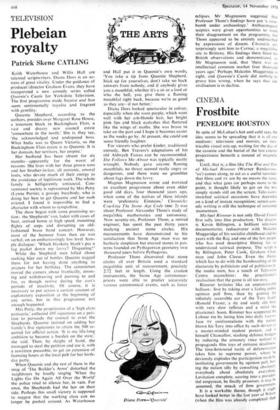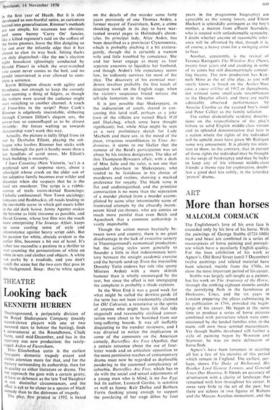CINEMA
Frostbite
PENELOPE HOUSTON
In spite of McLuhan's hot and cold taps, the idea seems to be spreading that it is all one medium: television and movies, an inex- tricable visual mix-up, waiting for the day of the cassette and the burial of the last cinema projectionist beneath a mound of magnetic tape.
Until, that is, a film like The Rise and Rise of Michael Rimmer (Warner Rendezvous. `aa') comes along, to act as a useful reminder that films and Tv are by no means the same. and that what goes (or perhaps more to the point, is thought likely to go) on the box simply stands still on the screen. Television's snatched satirical occasions have depended on a kind of instant recognition; screen com- edy writing is still the technique of sustained momentum.
Michael Rimmer is not only David Frost's first sally into film production. The director is Kevin Billington, a brilliant television documentarist, rediscoverer with Malcolm Muggeridge of his socialist childhood and his years with the Raj, and one of the few people who has used descriptive filming for an understated satirical purpose. The script is by Billington, Peter Cook, Graham Chap- man and John Cleese. Even the theme. which has to do with the bamboozling of the electorate by politicians and of politicians M the media men, has a touch of Television Centre masochism: the practitioner'. realisation that the game is all too easy.
Rimmer levitates like an unpuncturable balloon : first by taking over a fading public opinion poll firm, then by gaining the infinitely accessible ear of the Tory leader (Ronald Fraser, a sly and seedy old bird. with very slow reflexes and a mind like plasticine). Soon, Rimmer has scuppered the Labour PM by luring him into daily face-to- face Tv confrontations with the nation. blown his Tory into office by such devices as a master-minded student protest, and is himself Chancellor, slashing defence budgets by reducing the armoury (nice notion) to propaganda film toys of extreme deadlines%. The time-honoured tactic of defenestration takes him to supreme power, where he deviously explodes the participation myth bY instituting government by opinion poll. b01-- ing the nation silly by consulting absolutely everybody about absolutely everything. Levitation complete, soaring into a presiden- tial empyrean, he finally promises, it may he assumed, the smack of firm government. It is a workable theme, though it might have looked better in the last year of Wilson (when the film was already completed) than
in the first year of Heath. But it is also developed as non-hurtful satire, as caricature fuzzed into generalisation. Rimmer's methods are too simple, his successes too obvious; and some barmy 'Carry On' fancies, Ike a kilted regiment's raid on the coffers of the Swiss gnomes, leave the film dangling so far out over the infantile edge that it has almost to claw its way back. Sitting ducks are duly dispatched—like the BBC's election night broadcast (gloatingly conducted by Harold Pinter) in which the over-watched vote count never comes to the boil, and no pundit interviewed is ever allowed to com- plete a sentence.
Kevin Billington directs with agility and blandness; not enough to keep the comedy from seeming a thing of fidgets, as though the writers were scared the audience might start switching to another channel. A touch of Frost-bite in the script? Peter Cook's Rimmer is edgelessly inscrutable, slithering through Carmen Dillon's elegant sets, the power-lust so camouflaged as to be almost invisible: the forces wafting us towards dictatorship won't work this way.
Actually, the picture is tidily !MO from its star by Denholm Elliott, playing the col- league who loathes Rimmer but sticks with him. Although the part is hardly more than a few handfuls of acrid straw, Mr Elliott's brick-building is masterly.
Start Counting (New Victoria, 'AA') is a perplexed sort of suspense story, about a schoolgirl whose crush on the elder son of her adoptive family becomes ever wilder and dreamier when she suspects that he is the local sex murderer. The script is a rabbit- warren of trails (mini-skirted flouncings; Catholic confessional; New Town sociology; fantasies and flashbacks), all roads leading to the inevitable scene in which girl meets killer in the old dark house. Jenny Agutter makes the heroine as little tiresome as possible, and David Greene, whose last film was the much more enterprising The Strange Affair, keeps up some cooling sense of style and circumstance against heavy script odds. But his passion for white, already evident in the earlier film, becomes a bit out of hand. It's rather too recondite a pastime in a thriller to start counting the permutations of white on white in-sets and clothes and objects. A white 'an parks by a roadside, and you don't watch the scene but the two cars that pass in the background. Snap: they're white again.









































 Previous page
Previous page